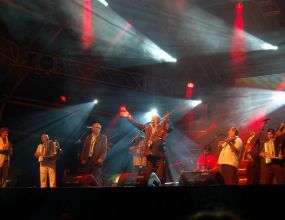 Taraf de Haidouks' concert in Galicia (2008). Source: Wikimedia Commons, by Estevoaei at Galician Wikipedia.
Taraf de Haidouks' concert in Galicia (2008). Source: Wikimedia Commons, by Estevoaei at Galician Wikipedia. Taraf de Haïdouks, originating from Clejani, Romania, is a Roma troupe of lăutari, traditional musicians, renowned for its vibrant and authentic representation of Roma folk music, often using traditional instruments such as the dhol, harmonium, tabla, some wind, and string instruments. Taraf de Haïdouks has played a crucial role in preserving and promoting Roma music, and their dedication to their craft and their ability to adapt while staying true to their roots have ensured their place as one of the most influential world music groups of all time.
Taraf de Haïdouks, originating from Clejani, Romania, is a Roma troupe of lăutari, traditional musicians, renowned for its vibrant and authentic representation of Roma folk music, often using traditional instruments such as the dhol, harmonium, tabla, some wind, and string instruments. They still perform nowadays, but with different The lăutari from the village of Clejani have a long-standing reputation for their musical talents. Ethnomusicologists first recorded their performances during the interwar period. In 1983, Romanian folklorist Speranța Rădulescu also conducted recordings in Clejani for the archives of the Bucharest-based Institute for Ethnography and Folklore of the Romanian Academy, capturing various configurations of their music. During the Communist era, many lăutari from Clejani were employed in national ensembles that performed Romanian popular music.
Early years and formation
Formed in the early 1990s, Taraf de Haïdouks, or "Band of Outlaws," was brought together by Swiss ethnomusicologist Laurent Aubert and Belgian musicians Stéphane Karo and Michel Winter, who were captivated by the local musicians' virtuosity during their visit to Romania. Michael Winter, who became their manager, gathered a dozen of the village's finest musicians, named them Taraf de Haïdouks (which means “band of outlaws” from Romanian), and helped them organize shows and later record albums. The group consisted of veteran musicians who played traditional instruments such as the violin, accordion, and cimbalom. The ensemble’s repertoire includes a diverse range of pieces, from lively dance tunes to haunting ballads. Neacsu Nicolae, one of the band’s veteran violinists, invented the technique of dragging a horse hair across his violin while playing, which later became one of the characteristic features of their performance.
Rise to fame
Their big break came in 1991, when they were invited to perform at the WOMAD festival in England. The performance was a huge success, and they quickly became popular on the world music scene, releasing several albums that were met with critics’ approval. Their debut album, "Musique des Tsiganes de Roumanie," topped Europe's world music charts and set the tone for their career, showcasing their unusual talent and deep connection to their heritage. Their second album, “Honourable Brigands”, released in 1994, was awarded "Best World Music Album" by the German Critics Association. The band's success continued with “Dumbala Dumba” in 1998, featuring notable guest artists such as Rosioru, a master of Valachian Gypsy singing, renowned Romanian vocalist Viorica Rudareasa, and Napoleon, a member of the Urasi bear trainer caste. In 1999, they released their self-titled fourth album.
In 2002, the group was awarded the prestigious BBC Radio 3 World Music Award, a testament to their impact and influence on the world music stage.
Roma legacy
As a group of Roma origin musicians, Taraf de Haïdouks has played an essential role in preserving and promoting Roma culture and music, which have a tradition of “one thousand years of father-to-son musical training”. Their music, deeply rooted in Roma traditions, offers a glimpse into the rich musical traditions of the Roma, challenging negative stereotypes and prejudices. Through their music, they have brought attention to the Roma's unique cultural heritage, helping to combat stereotypes. As the band’s star violinist, Caliu, said in his interview to BBC:
“It is not enough for people to love the music if you don’t know where it’s coming from. It’s not enough to love the music and hate the people it comes from. People should respect our culture and accept Gypsies as they are. Some of our customs may be difficult to understand, but the music and the culture are one. It’s a unity”.
The group's extensive media coverage has provided them with platforms to speak about Roma issues. In interviews, they have often discussed the socio-economic hardships faced by the Roma, including discrimination, poverty, and lack of access to education and employment opportunities. These discussions have helped bring these issues to the forefront, engaging a global audience.
Participation in films like Tony Gatlif's “Latcho Drom", a documentary that traces the migration of the Roma people through music, Sally Potter's "The Man Who Cried", Guy Demoy's documentary and movie “When the Road Bends… Tales of a Gypsy Caravan” has not only showcased their musical prowess, but also highlighted the Roma way of life and the challenges they face. These films have reached wide audiences, helping to humanize the Roma experience and promote understanding and empathy.
Collaborations with artists from various genres have expanded their reach and brought Roma issues to the attention of diverse audiences. By working with well-known artists and groups, Taraf de Haïdouks has been able to share their message more broadly.
Taraf de Haïdouks has played a crucial role in preserving and promoting Roma music, and their dedication to their craft and their ability to adapt while staying true to their roots have ensured their place as one of the most influential world music groups of all time. Answering the question, why people responded so strongly to traditional Roma music, one of the band’s participants said: “It reminds them of something they have lost... a kind of strong music of tradition. Because Gypsy Roma music is not so far from what we know here. It’s really authentic music, and maybe Western audiences tire of those big stars that are so distant. We are ordinary people who play music.”